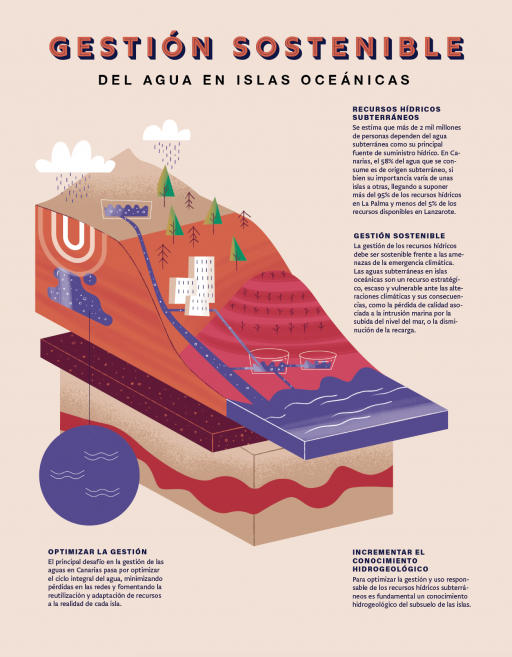Drinking water on islands: a vital asset to preserve
The main challenge for the Canary Islands is to achieve efficient and sustainable management of groundwater, making it possible to optimize its complete cycle.
In 2030, the Canary Islands must continue to guarantee universal and equitable access to drinking water for their entire population at an affordable price, even when rainfall is absent or insufficient. Currently, it is estimated that more than two billion people worldwide depend on groundwater as their main source of supply. In the Canaries, this is also one of the main water resources. Some 58 % of their population depends on this, although each island makes use of it in different ways. For example, while on Lanzarote it is practically non-existent, on La Palma it amounts to 100 % of the available water resources. However, groundwater is becoming less abundant due to its vulnerability to the climate alterations our planet is already undergoing. These involve increasingly prolonged droughts in the archipelago and also a rise in sea level, which is estimated to reach one metre by the end of the century. This rise can cause further intrusions of sea-water into coastal galleries and wells, which leads to a great loss in quality of this precious resource.
The Canary Islands are highly vulnerable to the consequences of global warming. For this reason, researchers are now focusing their efforts on studying the archipelago's terrain in depth to enable the population to continue to be self-sufficient in this precious resource, even when climatic conditions are against us. The key to achieving this is good resource management, without damaging the environment.
Hence, the main challenge for the coming years in the Canaries, as for other oceanic islands, is to fully optimize each step of the water cycle. The objective is to try to reduce losses in irrigation and supply networks however small they may be, as well as to promote reuse of the resource and adapt this to the reality of each island. By way of example, it is essential to adapt and plan the type of crops to be grown with the available water resources in each area of each island. This will help avoid imbalances and promote efficient management of the resource and the territory.
Through the ambitious COMPACT research project funded by the Ministry of Science, the researcher Pablo J. González is working on this at the Institute of Natural Products and Agrobiology (IPNA-CSIC), together with the hydrogeologist Rayco Marrero. They are developing an efficient, sustainable and replicable method to estimate how groundwater resources vary, without the need to drill the ground. "Hydrogeological knowledge of the subsoil of the islands is essential to optimize the management and responsible use of their water resources," say the researchers, who consider that this progress will provide valuable information to the administrations to better manage the water resources of the archipelago.



